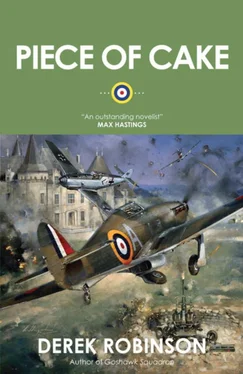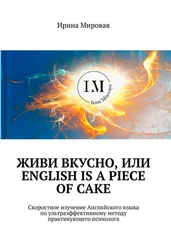“All right, what’s this?” Flip Moran asked. He flashed a card about a foot square and hid it behind his back.
“Messerschmitt 110,” said Mother Cox.
“Junkers 88,” said Moke Miller.
“Balls. It’s a 110,” said Pip Patterson.
Moran looked at the other pilots in the lecture room.
“Well, it’s not one of ours,” said Dicky Starr.
Moran held up the card. “Messerschmitt Bf 110,” he said. They stared at the plan-view silhouette of a twin-engined plane. Miller groaned. “So what’s the difference?” Moran asked him.
“Twin tail-fins on the 110,” said Mother Cox. “Obviously.”
“Flip had his fingers over the tail,” Miller protested.
“Useless fart, Moke,” said Patterson.
“The Jerries are very keen on this machine,” Moran said. “It seems they’re using it in Poland at this very moment.”
“It seems they’re using everything in Poland at this very moment,” said Cox.
“Two Daimler-Benz engines, each as big as a Merlin,” Moran said, “so it’s not slow. Now then, what’s this?” As he flashed another card, Cattermole opened the door and they all turned to look. He was still in gym-kit, and his chest was heaving.
“That’s a Fokker,” said Fitz Fitzgerald confidently. “Ugly, isn’t it?”
Patterson whistled. “But what an undercarriage.”
“Hello, chaps,” Cattermole gasped.
“Terrific camouflage job,” Fitzgerald said. “Blends perfectly with the sewage works.”
“Where’s the Ram?” Cattermole asked. “I’ve looked everywhere.”
“He’s gone to London with the adj,” Barton said.
“What?” Cattermole sagged against the wall. “Why?”
“There’s something odd about you, Moggy,” Moran said. “Did you omit to shave, or what is it?”
Cattermole sank to a squat, leaving a long wet stain on the wall. “What a swindle,” he muttered.
“Is that real blood, Moggy?” asked Starr, pointing.
“Not mine.” Cattermole picked feebly at his leg. “Sticky’s.”
“You ran him down, did you?” said Fitzgerald. “And then you kicked him to death?”
“He had it coming to him, rotten little swine,” Miller said. “Bags me his Buick.”
“Why’ve they gone to London?” Cattermole asked again.
“There’s a flap on,” Barton said. “The Ram’s been called to an urgent meeting at the Air Ministry.”
“Bloody Poland, I suppose,” Cattermole muttered.
“Europe is at the crossroads,” Patterson said knowingly. “Hold you it was. You watch. Anything might happen.”
The telephone rang and Moran answered it. The message was brief.
“Get your woolly socks on,” he told them. “That was the controller. Squadron’s been put at fifteen-minute readiness.”
“It’s those damned war-clouds,” Patterson said.
When Stickwell hobbled in on blistered feet, everyone else was in flying kit. The squadron remained at readiness for the rest of the day, nervously bored, arguing about the BBC news bulletins (rapid German advances, resolute Polish resistance, intense diplomatic activity) and passing around the various rumors that sifted in from God-knew-where (sector ops room? sergeants’ mess? a visiting ferry pilot? the Battle boys across the way?) to the effect that a pair of Spitfires had shot down a reconnaissance Dornier over Kent; the Duke of Windsor had met Mussolini; the Prime Minister had collapsed with a heart attack (“That’s the only attack you’ll get out of him,” Flip Moran remarked); U-boats had torpedoed an American liner in mid-Atlantic; a cloud of poison gas was drifting over the English Channel; and trains loaded with tanks bearing Polish markings had been seen arriving at the Port of London.
It was a long, restless afternoon. At about four o’clock Fanny Barton tried to contact the Ram at Air Ministry, just to know what was really happening. A harassed telephonist connected him to an air commodore called Ramshaw, who seemed to be in a crowded and noisy room; he let Barton say a dozen words, barked “How the hell should I know?,” and crashed the phone down. Ten minutes later the adjutant telephoned Barton. “I got some sort of message that you’d got some sort of message,” he said. “Not really,” Fanny said. “I just wanted to keep in touch with the CO.” Kellaway laughed. “So do I, old boy. Haven’t seen him for hours.”
“What’s happening?”
“God knows. This place is pure bedlam. I can’t even get a cup of tea.”
“We’re on standby.”
“Are you? Jolly good. Actually I think everyone’s on standby, except me. I’m at instant readiness, although for what I really haven’t the faintest… Ah, thanks immensely … Tea at last,” he told Fanny.
“They say some Spits got a Dornier over Kent,” Fanny said. “Is that right?”
“Spits? I heard it was Defiants from 264 Squadron. Only it wasn’t a Dornier, it was a—”
The line went dead.
“Any joy?” Cattermole asked, from an armchair.
“Not much,” Barton said.
“Come and play ping-pong, Fanny,” Starr called. “I’ve smashed everybody else. If I beat you I’m world champion.”
They were released by the controller at 8 p.m. “So much for your wonderful war-clouds,” Cattermole said as they peeled off their flying overalls.
“A little more respect, young man,” said Patterson, “or you won’t get invited to my twenty-first birthday party.”
“When?”
“Today, actually. Not that I’ve arranged anything…”
“Don’t worry about that, Pip. Sticky, d’you feel like a party? Silly question. Okay, you can drive. Where’s Mother Cox? Mother, lend us a couple of quid.”
“No fear.”
“Well, all right, a fiver then. It’s for a good cause. We’re going to get blotto.”
“I might come with you,” Cox said. “I could do with a glass of ale. We won’t be late back, will we?”
“Heavens, no!” Cattermole said.
When Squadron Leader Ramsay and his adjutant arrived at Air Ministry, they were told that the meeting had been rescheduled for later in the day; meanwhile a secret briefing had been laid on, so secret that Kellaway was excluded; so secret, indeed, that nobody seemed sure where it was taking place. An elderly warrant officer with a clipboard searched repeatedly through a sheaf of duplicated papers and eventually directed the Ram to a remote anteroom. This turned out to be full of Bomber Command aircrew. One by one they were called out until, after an hour, only the Ram and a Fleet Air Arm liaison officer remained. Nobody knew why they were there. Nobody knew anything about the elderly warrant officer. The Ram cornered a civil servant and for ten minutes there was intensive telephoning around the building. “Group Captain Matthews wants to see you both,” the civil servant said at last. “Room 4502.”
“Who’s he?” the Ram asked.
“I’m not sure. He’s either DTA to the AOCFFU, or he’s deputizing for PQLO on the ADGB, You’ll have to ask him, I’m afraid.”
They had no opportunity to ask him. As soon as they entered room 4502, Matthews handed each of them a booklet called Glossary of Anglo-Polish Aeronautical Terms. “See what you make of that,” he said. “Back in ten minutes.” He hurried off.
The Ram waited half an hour and then went in search of fresh orders. The corridors were full of urgent figures clutching important documents. He saw a flight lieutenant whom he recognized as the assistant to the staff officer of an air vice-marshal in Fighter Command, and explained his problem. “Crikey, you ought to be in Conference Room G,” the flight lieutenant said. “Something to do with anti-aircraft fields of fire, I believe…” But when the Ram found Conference Room G it was occupied by a pack of wing commanders arguing about aviation-fuel stocks.
Читать дальше












